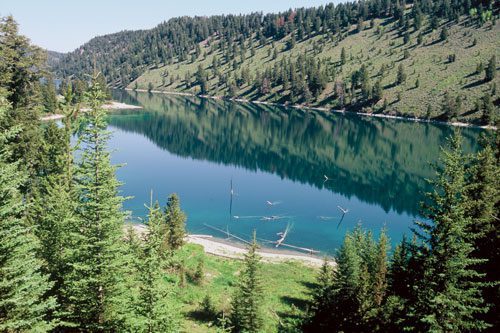Eco-tourism has evolved from a simple nature exploration activity to a more sustainable form of travel. Today, eco-tourism destinations focus on minimizing their ecological footprint through initiatives such as using renewable energy sources and supporting local communities. They also emphasize education and engagement to inspire visitors to become advocates for environmental protection. Some top eco-tourism destinations include Costa Rica, known for its national parks and biodiversity, and the Galápagos Islands, famous for their unique ecosystem.
Key Takeaways:
- Eco-tourism destinations prioritize the conservation and preservation of natural resources and ecosystems.
- These destinations offer unique opportunities for visitors to learn about and engage in sustainable practices.
- Eco-tourism destinations often support local communities by providing employment and economic benefits.
- Visiting eco-tourism destinations can contribute to raising awareness about environmental issues and the importance of conservation.
- Choosing eco-tourism destinations allows travelers to have a positive impact on the environment while enjoying their vacation.
Evolution of Eco-Tourism: From Nature Exploration to Sustainable Travel
Eco-tourism has evolved significantly over the years, transitioning from a simple nature exploration activity to a more sustainable form of travel. In the past, eco-tourism mainly focused on providing tourists with opportunities to observe and appreciate natural environments. However, as awareness about environmental conservation grew, eco-tourism destinations started incorporating sustainable practices into their operations.
Today, eco-tourism destinations strive to minimize their ecological footprint by implementing various initiatives. These include using renewable energy sources, reducing waste and water consumption, and supporting local communities through responsible tourism practices. Additionally, eco-tourism now emphasizes the importance of education and engagement, aiming to inspire visitors to become advocates for environmental protection.
Discover the Top Eco-Tourism Destinations Around the World
The world is full of incredible eco-tourism destinations that offer unique experiences while promoting sustainability. From lush rainforests in Costa Rica to pristine marine ecosystems in the Maldives, these destinations provide opportunities for tourists to immerse themselves in nature while contributing to conservation efforts.
Some top eco-tourism destinations around the world include:
1. Costa Rica:
- The country is known for its extensive national park system and commitment to preserving biodiversity.
- Tourists can explore dense rainforests, hike volcanoes, and spot diverse wildlife species.
- Eco-lodges and sustainable tour operators are prevalent in Costa Rica.
2. Galápagos Islands:
- This archipelago is famous for its unique ecosystem and played a significant role in Charles Darwin’s theory of evolution.
- Tourists can witness an array of endemic species, such as giant tortoises and marine iguanas.
- Strict regulations are in place to protect the fragile ecosystem, including visitor quotas and designated visitor sites.
3. Borneo:
- Borneo is home to one of the oldest rainforests in the world and is a biodiversity hotspot.
- Tourists can experience wildlife encounters with orangutans, pygmy elephants, and proboscis monkeys.
- Eco-tourism initiatives focus on conservation and supporting local communities.
Conservation Contributions: How Eco-Tourism Destinations Protect the Environment
Eco-tourism destinations play a crucial role in protecting the environment through various conservation efforts. These destinations understand that their natural resources are valuable assets that need to be preserved for future generations. They implement strategies to minimize negative impacts on ecosystems while maximizing positive contributions to conservation.
Some ways eco-tourism destinations protect the environment include:
Promoting Sustainable Practices:
- Eco-tourism destinations prioritize sustainable practices such as waste reduction, energy efficiency, and water conservation.
- They may use renewable energy sources like solar or wind power to minimize their carbon footprint.
- Efforts are made to reduce single-use plastics by providing reusable alternatives or encouraging visitors to bring their own eco-friendly products.
Habitat Restoration:
- Eco-tourism destinations often engage in habitat restoration projects, such as reforestation or coral reef rehabilitation.
- They work closely with local communities and conservation organizations to restore and protect fragile ecosystems.
Wildlife Conservation:
- Eco-tourism destinations prioritize the protection of wildlife habitats and implement responsible viewing guidelines.
- They collaborate with researchers and experts to monitor and conserve endangered species.
- Tourists are educated about the importance of ethical wildlife interactions, such as maintaining a safe distance from animals and not disturbing their natural behavior.
Economic Benefits of Eco-Tourism: Empowering Local Communities
Creating Job Opportunities
Eco-tourism has the potential to generate employment opportunities for local communities. By attracting tourists to natural areas, eco-tourism destinations can create jobs in various sectors such as hospitality, transportation, guiding services, and handicraft production. These jobs not only provide income for individuals but also contribute to the overall economic development of the region.
Supporting Local Businesses
One of the key economic benefits of eco-tourism is its ability to support local businesses. When tourists visit eco-tourism destinations, they often seek authentic experiences and products that are locally made or sourced. This creates a market for local artisans, farmers, and entrepreneurs to showcase their products and services. By purchasing from these businesses, tourists directly contribute to the local economy and help sustain traditional livelihoods.
Promoting Sustainability: How Eco-Tourism Destinations Educate and Inspire Tourists
Environmental Education Programs
Eco-tourism destinations play a crucial role in educating tourists about environmental issues and promoting sustainable practices. Many eco-tourism sites offer educational programs that aim to raise awareness about conservation efforts, biodiversity preservation, and responsible tourism behavior. These programs may include guided nature walks, workshops on sustainable living, or interactive exhibits that highlight the importance of protecting fragile ecosystems.
Showcasing Sustainable Practices
Eco-tourism destinations often serve as models for sustainable practices by implementing environmentally friendly initiatives themselves. They may use renewable energy sources, practice waste reduction and recycling, or promote organic farming methods. By showcasing these sustainable practices to visitors, eco-tourism destinations inspire tourists to adopt similar behaviors in their own lives and become advocates for sustainability in their communities.
The Role of Education in Eco-Tourism: Empowering Visitors for Environmental Conservation
Informative Interpretive Centers
Eco-tourism destinations often have interpretive centers that provide visitors with detailed information about the local environment, wildlife, and conservation efforts. These centers may have interactive exhibits, informative displays, and knowledgeable staff who can answer questions and engage visitors in discussions about environmental issues. By educating visitors, these centers empower them to make informed decisions and take action towards environmental conservation.
Guided Educational Tours
Many eco-tourism destinations offer guided tours led by knowledgeable experts who provide valuable insights into the natural surroundings. These tours may focus on specific topics such as birdwatching, marine life, or forest ecology. Through these educational tours, visitors gain a deeper understanding of the ecosystems they are exploring and develop a sense of appreciation for the importance of protecting them.
Government Support and Regulation: Ensuring Responsible Practices in Eco-Tourism Destinations
Licensing and Certification Programs
Governments play a crucial role in ensuring responsible practices within eco-tourism destinations through licensing and certification programs. These programs set standards for eco-tourism operators to meet in terms of environmental sustainability, community involvement, and visitor safety. By obtaining certifications or licenses, eco-tourism businesses demonstrate their commitment to responsible practices and provide reassurance to tourists.
Monitoring and Enforcement
Government agencies are responsible for monitoring eco-tourism activities to ensure compliance with regulations. They conduct regular inspections of facilities, review permits, and investigate any reported violations. By enforcing regulations, governments help maintain the integrity of eco-tourism destinations and protect natural resources from overexploitation or degradation.
Challenges in Balancing Tourism and Preservation: The Dilemma Faced by Eco-Tourism Destinations
Overtourism
One of the main challenges faced by eco-tourism destinations is the risk of overtourism. When the number of tourists exceeds the carrying capacity of a destination, it can lead to negative impacts such as overcrowding, increased pollution, and damage to fragile ecosystems. Balancing the desire for economic growth through tourism with the need for environmental preservation requires careful planning and management strategies.
Conflicting Interests
Eco-tourism destinations often face conflicts between different stakeholders with varying interests. Local communities may have different priorities than conservation organizations or tourism operators. For example, while some community members may rely on eco-tourism for their livelihoods, others may be concerned about the potential negative impacts on their traditional way of life. Finding common ground and ensuring that all stakeholders are involved in decision-making processes is essential for sustainable development.
Success Stories: How Eco-Tourism Projects Benefit Communities and Ecosystems
Community Empowerment and Income Generation
Successful eco-tourism projects have been able to empower local communities by providing them with opportunities for income generation and capacity building. By involving community members in various aspects of eco-tourism, such as guiding services or handicraft production, these projects help create a sense of ownership and pride among community members. The income generated from eco-tourism activities can be reinvested in community development initiatives, improving infrastructure, healthcare facilities, or education opportunities.
Ecosystem Conservation and Restoration
Eco-tourism projects have proven to be effective tools for ecosystem conservation and restoration. By designating protected areas or establishing nature reserves, these projects ensure the preservation of biodiversity hotspots and critical habitats. Additionally, revenue generated from eco-tourism activities can be used to fund conservation efforts such as habitat restoration programs or wildlife monitoring initiatives. This not only benefits the ecosystems themselves but also contributes to scientific research and understanding of these fragile environments.
In conclusion, eco-tourism destinations offer a unique and sustainable way to explore the natural wonders of the world while promoting conservation efforts. These destinations provide travelers with the opportunity to appreciate and protect the environment, making them an increasingly popular choice for responsible and conscious tourists.
What are ecotourism destinations?
Ecotourism involves traveling to destinations that highlight the natural environment, wildlife, and cultural heritage. The purpose of ecotourism is to educate tourists about the impact of humans on the environment and to encourage a deeper appreciation for our natural habitats.
What is an example of ecotourism tourism?
Ecotourism includes activities such as camping, hiking, and observing wildlife. One specific example of ecotourism is traveling to Tanzania to witness the native wildlife.
What is an example of green tourism?
The Six Senses Resort in Fiji is a top-tier, eco-friendly resort that follows sustainable tourism practices. It utilizes solar energy for all its power needs and has implemented rain capture and water filtration systems to minimize the use of plastic bottles.
Is Airbnb an ecotourism?
Airbnb places a strong emphasis on environmental concerns, including the climate crisis and the decline of biodiversity. The company has made a commitment to collaborating with prominent global organizations and experts in ecotourism to ensure sustainable practices, such as promoting sustainable travel for both hosts and guests using its platform. This commitment demonstrates their dedication to environmentally responsible operations.
What is an example of hard eco tourism?
Hard ecotourism is the most luxurious form of ecotourism, often involving minimal hotel accommodations and amenities. An example of hard ecotourism is staying at a eco-friendly campground for sleeping.
Which country is number 1 in tourism?
France is the top destination for international tourists, attracting 117,109,000 visitors due to its extensive history and famous landmarks.




